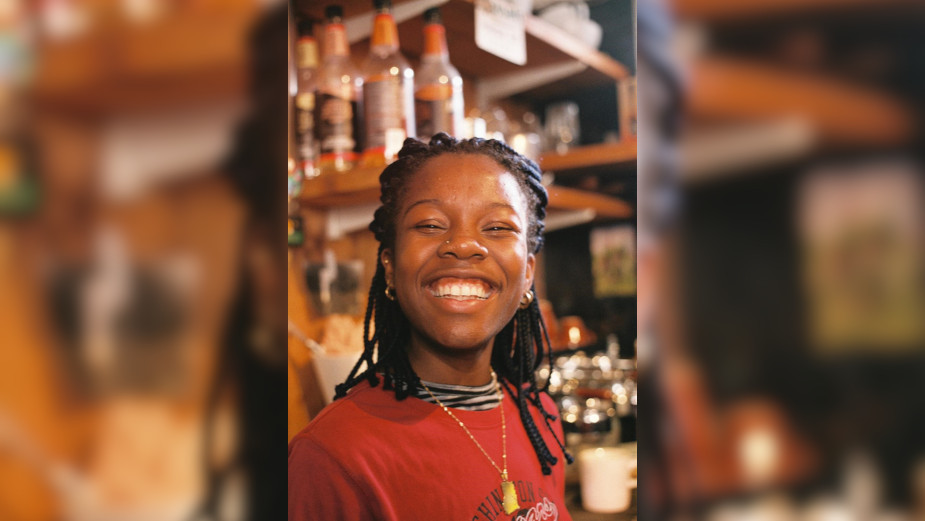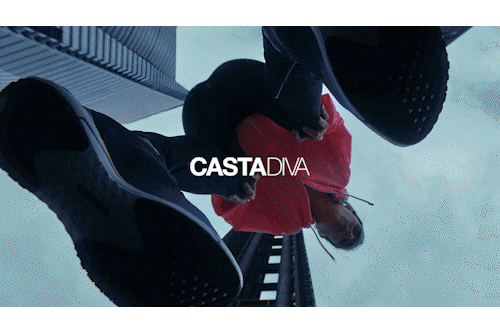
Uprising: Taking up Creative Space with Nana Ama Owusu-Ansah

A bright, but “admittedly [a] very cheeky kid,” Nana Ama Owusu-Ansah, knows she always loved making and creating, but until just a few years ago, she couldn’t have ever imagined working as a freelance photographer, writer, and full-time junior creative at The Brooklyn Brothers. Growing up as an artistic child and being into all types of crafts and music, Nana loved shooting on disposable Boots cameras and journaling. As early as eight years old, she became obsessed with knitting and remembers being quite invested in the piano (which she still keeps to herself, usually avoiding playing for anyone else).
As a Black British Ghanian woman, Nana explains that her cultural background has “strongly impacted [her] outlook,” both creatively and on a personal level. Switching between speaking English and Twi, she observes “both traditions of a Sunday roast or a Sunday fufu and Nkatenkwan (peanut butter soup)” and has a wardrobe half full of diamante-studded-flares and half traditional Ghanian outfits. “At times, I’ve been very resistant to accepting my cultural background,” admits Nana. “But now, I take pride in celebrating difference, seeking community and finding ways to culturally ground myself in this ever-changing world.” This is also something that she continually tries to do through her creative work.
At university, Nana opted for something unexpected, keeping in mind her artistic inclinations - economics and Spanish - which she eventually really enjoyed. “Retrospectively, the former subject choice was more of a happy compromise for my parents. Outside of lecture halls, I gravitated towards creative communities, spending my free time photographing at student events and collaborating on creative projects. I also completed a study abroad in Madrid, which was a formative experience, and is a city I would love to move back to one day.”
In 2019, Nana took part in a mentorship program with The Brooklyn Brothers called Night School, where she made a number of connections which became the basis of the start of her career. “On the programme, I was exposed to creative paths I didn’t even know existed, after which I decided I would like to start in film production.” With the help of her mentors, she spent the following year connecting with people in the industry and learning more about their own journeys and the ways in which they intersect with her own. “I was trying to convince them to take a chance on me,” says Nana.
When it comes to honing her craft, the junior creative is aware that this is still very much a work in progress. However, she also knows that saying ‘yes’ to opportunities is what helped her develop her photography skills. That, and desperately Google-ing techniques she wanted to emulate. Saying ‘yes’ was also at the top of the list of things that helped her develop her writing, which ultimately led to her being published by Dazed, Wallpaper and SLEEK magazine. “Now, as a junior creative at The Brooklyn Brothers, I’m developing my copywriting, visual research and presenting skills amongst other things, through the support of the inspiring creatives I get to work with every day.”
And when Nana speaks of her first project of real significance, she looks back at her third year at university, when she was the lead photographer for an exhibition in London run by Korantema Anyimadu, called ‘Plait’s Princesses & Pink Moisturisers’. She says, “It was the first time I had created a tangible body of work that was shared with the public, and actually gotten paid for it! Suddenly, pursuing a creative career felt that bit more in reach. I owe a lot of my creative journey so far to the people who were there in the room on the opening night of the exhibition.”
Those kinds of people are who inspire Nana and are her favourite part of her career. The connections she makes with them, whether through working together on a brief, taking photos at their event, or interviewing someone for an article, prove to be of great value to her own development as a creative and as a person. “Human interaction comes out on top,” she says. On the flip side, what is the most challenging part of her work is that creative work is so inextricably linked to who Nana is as a person. “Being creatively ‘on’ all the time can often lead to burnout. I have to keep reminding myself that it’s ok to sometimes not feel like creating, and when I do, to remember the joy of creating without a commercial motive behind it.”
Creative work, be it in her free time or for work, for Nana needs to always challenge the status quo and bring more diverse perspectives to the table. “As a photographer, writer and aspiring filmmaker, I would love to use my craft to continue telling stories about things that matter to me. I often gravitate toward themes of cultural identity, activating archival material, exploring language and opening up discussions on design in the built environment.” For Nana, growing up in London was pivotal for developing those themes, as she was able to at any time tap into the endless creative possibilities the city has to offer, from events, to gigs and galleries.
As any young creative, Nana has noticed one of the most frustrating aspects of the industry, which she stumbled upon at the time when she was trying to land her first job. “I would get really riled up about the catch-22 situation of needing to have X amount of years of experience for entry level roles. While I could deal with rejection, it was frustrating to hear over and over that I needed more experience, when this was exactly why I was applying for the role.” This is why she also believes that the industry should be providing more training opportunities with lower barriers to entry, for people who haven’t gone to ad-school, studied a creative course, or even studied full stop. “Once these people start progressing in the industry, it’s important that there are adequate support networks, and they are not left feeling that they’re a ‘diversity-hire’. It’s important that these people feel they, as much as anyone else, have a future in the industry.”
It isn’t the first time that tokenism has been picked up as a discussion within the industry, and for Nana, especially after the global resurgence of the Black Lives Matter movement, “all too often organisations are quick to jump on trends of performative allyship, but are not willing to do the deep work to meaningfully integrate the people they say they advocate for.” She is aware that all those actions might not happen overnight, but she is also categorical that more genuine effort needs to be made by people in current leadership roles.
Despite all the downsides that the industry inevitably still has to overcome collectively, to Nana nothing will beat the excitement of going past the first hurdle and actually getting noticed by more people, taking up space in ways she couldn’t have imagined until a few years ago, and contributing in meaningful ways to those so necessary changes that are yet to happen.












